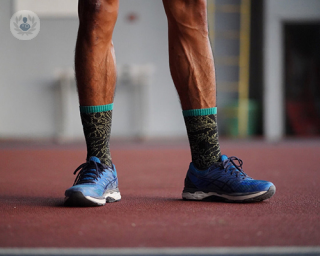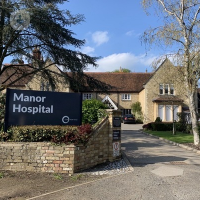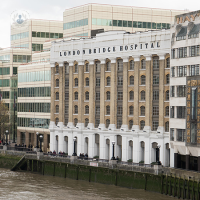Leg ulcers
Mr Benjamin Lindsey - Surgery
Created on: 05-24-2017
Updated on: 05-16-2023
Edited by: Conor Dunworth
What are leg ulcers?
A leg ulcer is a chronic, unhealed sore which generally develops on the inside of the leg. Leg ulcers form when there is a break in the skin of the leg, and bacteria and air get into the tissue underneath.

Prognosis
With the right treatment, most leg ulcers are able to heal within 3 to 4 months. However, if you have had one ulcer, it is possible that another could develop in the years following. If your doctor believes you may be at risk of developing further ulcers, they may suggest you wear compression stockings, which squeeze the legs and improve circulation. Ulcers are more likely to come back if the cause of the ulcer is not identified and treated properly.
Symptoms of leg ulcers
Symptoms can include:
- Itchy skin on the legs
- Scaly or hardened skin around the ulcer
- Red or flaky skin
- Unpleasant-smelling discharge coming from the ulcer
- Discolouration of the skin
- Swollen ankles
- Swollen legs
- Swollen veins on the legs
Medical tests to diagnose leg ulcers
An ulcer can be diagnosed by assessing the symptoms and looking at the leg which is affected, but in order to properly treat the leg ulcer, the cause must be determined. In order to find the cause of the leg ulcer, your doctor will ask you about any underlying conditions or injuries to the leg you might have had (e.g a deep vein thrombosis, previous ulcers). Your doctor will examine your legs in both a standing and lying position, as varicose veins are more visible when standing.
Certain tests may be performed to determine the cause of the leg ulcer, and investigate for problems with the veins or arteries in the legs, such as ultrasounds, CT scans, or MRIs.
What are the causes of leg ulcers?
As skin cells break down, air and bacteria can get in to the tissue below. Generally, the underlying cause of leg ulcers is disease in the veins of the leg, and problems with the blood supply to the skin. There are different types of leg ulcer with different causes:
- Venous ulcer, accounting for about 80% of all leg ulcers. This occurs when the veins in the leg do not function as they should.
- Arterial ulcer, accounting for 15% of leg ulcers, and occurring due to problems with the arteries.
- Leg ulcers caused by other conditions, such as diabetes and rheumatoid arthritis, accounting for the remaining 5% of ulcers.
Can leg ulcers be prevented?
If you are at risk from leg ulcers, it can help to wear compression stockings. Leg ulcers may also be prevented and risk may be reduced by exercising regularly, and losing weight if you are overweight.
Treatments for leg ulcers
First, the wound will be cleaned to remove any dead tissue from the area. Then, a dressing will be applied which allows the ulcer to heal. This dressing will need changing, but your doctor or healthcare provider will explain to you how you should clean and dress the ulcer again. This, however, is a temporary treatment for leg ulcers, and does not address the underlying cause. Depending on the cause of the ulcers, they may be treated with endovenous surgery, a minimally-invasive procedure which treats the veins themselves.
Which type of specialist treats leg ulcers?
Doctors specialising in conditions affecting the veins and venous system are able to diagnose and treat leg ulcers. Vascular surgeons and general surgeons are able to treat leg ulcers, the former being a specialist in conditions affecting the venous system.

















